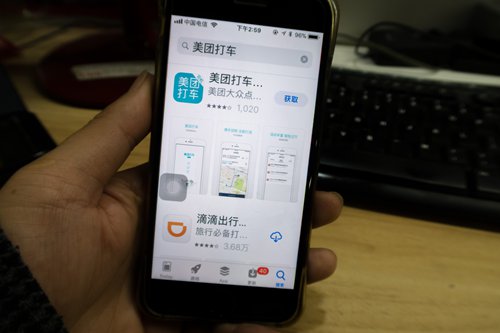China’s ride hailing market calls for tighter regulations on pricing, antitrust behaviors

Apps of Didi Chuxing and Meituan Dache are shown on a mobile phone. Photo: VCG
China’s ride hailing industry is increasingly becoming the subject of complaints, including from customers who feel the pressure of rising fees and drivers who seem to be receiving an ever-shrinking share of the revenue. Experts warn that the current ride hailing market in China is “plagued with loopholes” that allows aggregators to take excessive commission fees, and warns that without a comprehensive regulation, the industry faces becoming monopolized.
Currently ride hailing service companies in China are not subject to any cap on commission they are allowed to charge drivers, rates can range drastically from 20 percent to up to 35 percent, depending on time, distance and which city the driver is receiving riders.
A driver surnamed Jia working for a ride hailing company in Beijing said that drivers have zero negotiation power over the pricing, and they would not know how much they will earn from taking an order until a ride is completed.
“Normally we don’t have any access to information such as how much the aggregator has taken from the revenue unless we ask our customer how much they have paid,” Jia said, “It can vary from ride to ride. But usually the rate is especially high during rush hours or in a long-distance drive.”
According to Didi Chuxing, one of the biggest ride hailing service companies in China, the varying commission rates are a way to encourage drivers to take orders when there is less incentive to do so.
“But the as the industry grows, a lack of cap on commission fees can leave the drivers in the dark and vulnerable to exploitation,” Tian Yun, vice director of the Beijing Economic Operation Association, told the Global Times.
In China, the price of ride hailing services is decided solely by the market, with rare exceptions, according to a guideline published by the government in 2016. But Tian said that as the digital economy has expanded into almost every aspect of life, and that new guidelines can better fit the new age should be published.
“Unlike five years ago, ordering a taxi from apps is becoming the most common way of ordering a taxi,” Tian said, “and the operation of the ride hailing aggregators such as Didi, are across the country so they are not subject to local regulations. National guidelines must be introduced.”
Fluctuating commission rates have drawn attention from the regulators. In May, eight Chinese regulatory authorities jointly ordered 10 ride-hailing and freight companies to enhance safeguards protecting theinterests of drivers to ensure the healthy and “sustainable development of internet-based transportation businesses”.
Companies including Didi Chuxing, Meituan Chuxing, Alibaba-backed Gaode, and Chinese Uber-like freight company Huolala are among the companies which were singled out. The platforms were ordered to reduce commission rates to ensure the payment of their drivers.
